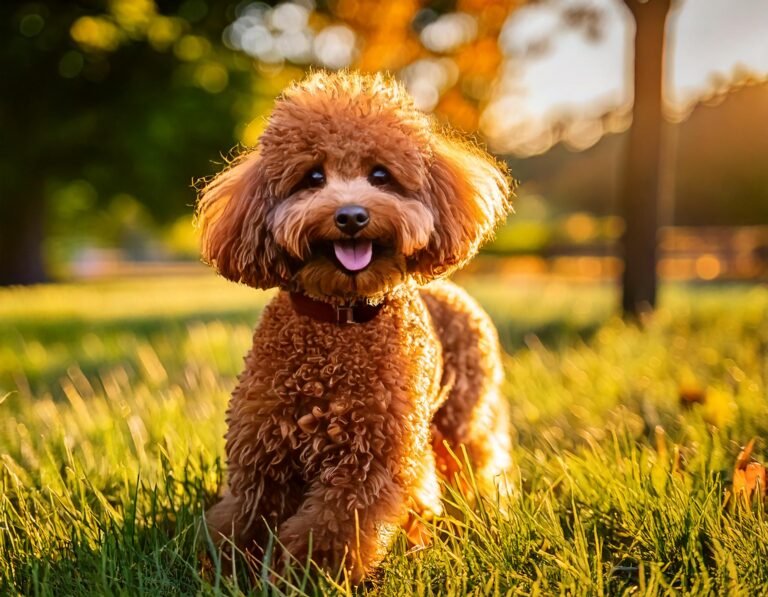
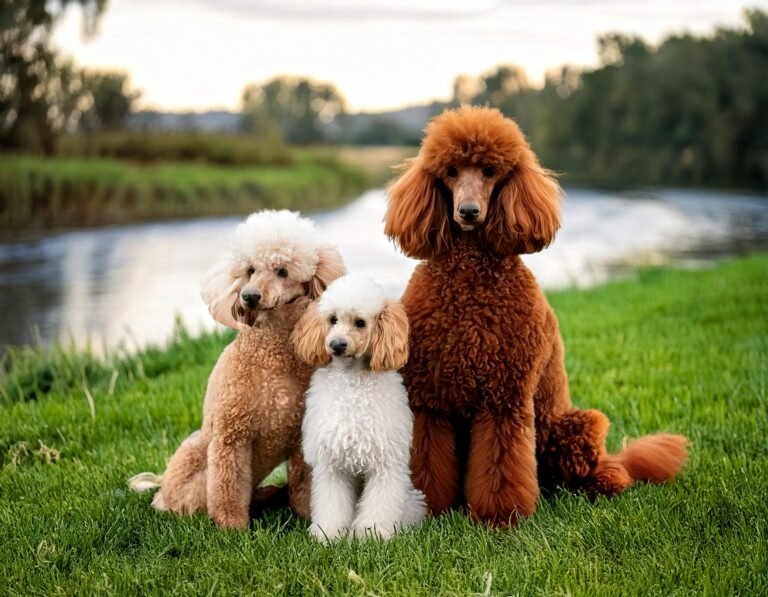
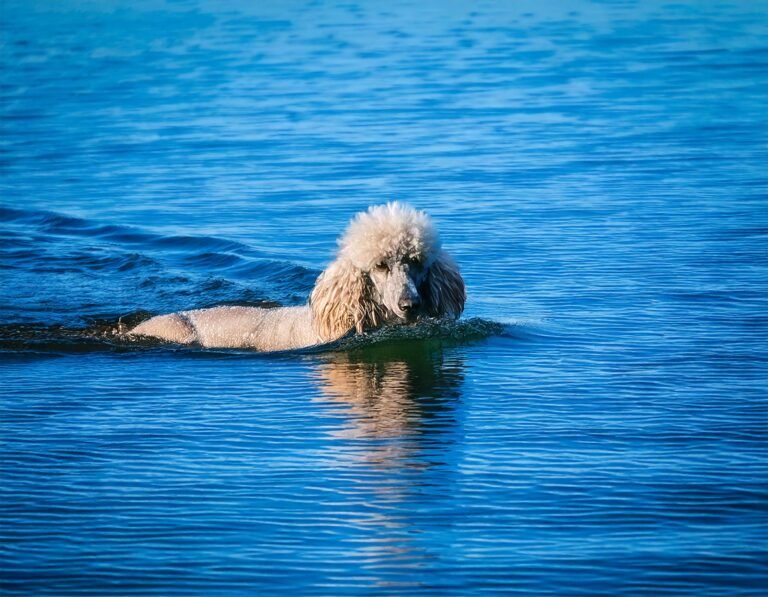
Poodle
An Elegant and Versatile Canine Companion
Introduction
The Poodle is a breed that embodies elegance, intelligence, and versatility. Known for its hypoallergenic curly coat and lively demeanor, the Poodle comes in three sizes—Standard, Miniature, and Toy—offering options for various lifestyles. These dogs excel as companions, athletes, and even performers in the show ring. With a rich history and an adaptable personality, the Poodle has earned its place as one of the most beloved breeds worldwide.
History and Background of the Breed
The Poodle, often associated with elegance and refinement, is a breed that has captured hearts worldwide. Originating in Germany, despite being commonly linked to France, the Poodle was initially bred as a water retriever. The breed’s name derives from the German word “pudel,” meaning “to splash in water.” French breeders later refined the breed, emphasizing its intelligence and stylish appearance, which earned the Poodle its status as a beloved companion among European aristocracy. Today, the Poodle is celebrated for its adaptability, intelligence, and iconic coat.
Poodles come in three officially recognized sizes: Standard, Miniature, and Toy. While all sizes share the same traits of intelligence and trainability, their size differences cater to various living environments and lifestyles.
Size and Physical Characteristics
Poodles are renowned for their striking appearance and athletic build. The tables below summarize key physical traits and characteristics:
| Trait | Standard Poodle | Miniature Poodle | Toy Poodle |
|---|---|---|---|
| Height | Over 15 inches | 10 to 15 inches | Up to 10 inches |
| Weight | 45 to 70 pounds | 10 to 15 pounds | 4 to 6 pounds |
| Characteristic | Description |
|---|---|
| Coat Length | Curly and dense, requiring regular grooming |
| Apartment Friendly | Highly adaptable, Miniature and Toy Poodles excel |
| Energy Level | High, especially in Standard Poodles |
| Tendency to Drool | Minimal |
| Tendency to Bark | Moderate, often alert and watchful |
| Tendency to Dig | Low to moderate, varies by individual |
| Tendency to Chew | Moderate, especially in younger dogs |
| Human Attention Need | High, thrives on interaction and companionship |
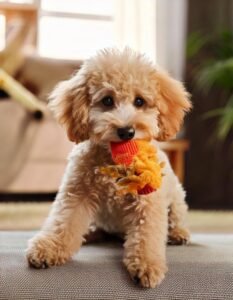
Unique Physical Characteristics:
- Curly, dense coat: Provides insulation and protection, originally aiding in water retrieval tasks.
- Long, straight muzzle: Contributes to their keen sense of smell and classic silhouette.
- Oval-shaped eyes: Impart an alert and intelligent expression.
- Long, floppy ears: Enhance their acute hearing abilities.
- Squarely built body: Reflects balance and agility.
- Webbed feet: Aid in swimming, highlighting their water retriever heritage.
Overall, Poodles present a harmonious blend of elegance and athleticism, characterized by their proud stance, graceful movements, and an air of distinction that sets them apart from other breeds. In summary, the Poodle’s physical appearance is both functional and fashionable, combining athletic grace with an undeniable flair for style. Their coat and build are key to their unique identity, making them instantly recognizable in any setting.
Temperament and Personality
Poodles are renowned for their intelligence, making them one of the easiest breeds to train. They are eager to please, adaptable, and quick learners, excelling in obedience and agility training. This breed is known for its affectionate nature and forms strong bonds with its human family. While Poodles are generally friendly and sociable, early socialization is essential to ensure they are comfortable in various environments.
Poodles are highly alert and make excellent watchdogs, often vocalizing when they sense unusual activity. Despite this, they are not overly aggressive and are more likely to charm strangers with their friendly demeanor. Their playful and lively nature ensures they bring joy and energy to any household.
Coat and Grooming
The Poodle’s distinctive curly coat is not just for show; it requires diligent care to maintain its health and appearance. Regular grooming is essential to prevent matting and tangling. It’s recommended to brush their coat at least 3-4 times a week using appropriate tools like a slicker brush to gently remove tangles and mats. Additionally, professional grooming every 4-6 weeks helps in maintaining their iconic look and ensures the coat remains clean and healthy. Regular grooming also allows for better inspection of parasites like fleas and ticks, contributing to overall skin health.
Indoor & Outdoor Living Considerations
Poodles are highly adaptable and can thrive in various living situations, from apartments to large homes with yards. Miniature and Toy Poodles are particularly well-suited to apartment living due to their smaller size. Regardless of size, Poodles require mental stimulation and regular interaction to prevent boredom and destructive behavior.
While Poodles enjoy indoor comforts, they also need outdoor activities to burn off their energy. A securely fenced yard is ideal for Standard Poodles, as their size and energy levels benefit from more space to run and play. Miniature and Toy Poodles, though smaller, also enjoy outdoor adventures and benefit from walks and playtime in safe environments.
Exercise Requirements
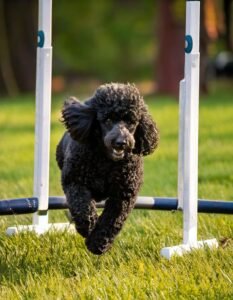
Poodles are energetic dogs that require regular exercise to maintain their physical health and mental well-being. The exercise needs can vary based on their size:
- Standard Poodles: Require 1-2 hours of daily exercise, including walks, playtime, and mental stimulation activities.
- Miniature Poodles: Need approximately 45-60 minutes of daily activity, which can include walks and interactive games.
- Toy Poodles: Benefit from 30-60 minutes of daily exercise, suitable for their smaller stature.
Engaging in consistent physical activity plays a vital role in maintaining the health and appearance of a Poodle’s coat. Regular exercise helps promote good blood circulation and natural oil distribution, reducing the risk of skin issues like dryness, dullness, and excessive shedding. Incorporating activities like swimming, fetch, and agility training can provide both physical exercise and mental stimulation, keeping your Poodle happy and healthy.
Favorite Activities and Toys
Poodles thrive on activities that challenge both their minds and bodies. Here are some favorite activities and recommended toys:
Interactive Play: Poodles enjoy fetch, tug-of-war, and hide-and-seek.
Water Sports: Their history as water retrievers makes them natural swimmers.
Training and Agility: Poodles excel in obedience trials, agility courses, and trick training.
Here are some highly-rated toys on Amazon that cater to these activities:
Dog Chew Toys for Aggressive Chewers
- Keep it Healthy: puppy teething toys, these natural rubber products fully protect them at this time, as biting can cause dental problems. The bristles on the corn are neatly aligned. Dog toothpaste can be squeezed into the grooves of the dog toothbrush stick. It effectively cleans teeth and controls the growth of tartar and plaque as your dog chews on tough dog toys!

French Bulldog Plush
- MEET OLIVER THE FRENCH BULLDOG: With this 13-inch stuffed dog stature, fluffy coat, and cuddly demeanor, he’s the epitome of cute and adorable. Perfect for babies and kids, Oliver is a charming companion for endless snuggles and playtime joy.

Benebone Small 4-Pack Dog Chew Toys for Aggressive Chewers
- DURABLE, LONG-LASTING –Benebones are tougher than real bones and last for weeks. Super-chewer? Bring it on.
- REAL FLAVOR – We use only 100% REAL FLAVOR like bacon, fish and even wood. Trust us, dogs can smell a fake from a mile away.
- EASY TO PICK UP AND CHEW – Benebones are uniquely designed for a paw-friendly grip so your pup can quickly grab them and get a good chew going. Think about it: dogs don’t have thumbs
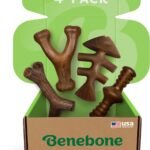
Breed-Specific Training Considerations
Breed-Specific Training Considerations
Poodles are renowned for their intelligence and eagerness to learn, making them highly trainable. To maximize training effectiveness:
Start Early: Begin training sessions as soon as you bring your Poodle home. Early socialization and basic obedience training lay the foundation for a well-behaved adult dog.
Use Positive Reinforcement: Reward-based training methods, such as treats, praise, or play, encourage desired behaviors and strengthen the bond between you and your Poodle.
Maintain Consistency: Establish clear rules and be consistent with commands and expectations. Consistency helps your Poodle understand what is expected and reduces confusion.
Provide Mental Stimulation: Incorporate puzzle toys and interactive games into training sessions to challenge your Poodle’s mind and prevent boredom.
Enroll in Training Classes: Participating in structured training classes can provide socialization opportunities and professional guidance, enhancing your Poodle’s learning experience.
Diet and Nutritional Considerations
Proper nutrition is vital for your Poodle’s health and longevity. Consider the following dietary guidelines:
High-Quality Protein: Ensure your Poodle’s diet includes high-quality animal proteins to support muscle development and overall health.
Balanced Diet: Provide a balanced diet that includes essential vitamins, minerals, and fatty acids. Consult with your veterinarian to select a suitable commercial dog food or to formulate a balanced homemade diet.
Portion Control: Monitor portion sizes to prevent obesity, which can lead to various health issues. Adjust feeding amounts based on your Poodle’s age, size, activity level, and metabolism.
Regular Feeding Schedule: Establish a consistent feeding routine to regulate digestion and prevent overeating.
Fresh Water: Provide access to clean, fresh water at all times to keep your Poodle hydrated.
Regular veterinary check-ups are essential to assess your Poodle’s nutritional needs and make necessary dietary adjustments. By providing appropriate nutrition, engaging toys, and consistent training, you can ensure your Poodle leads a healthy, happy, and fulfilling life.
Health and Lifespan
Poodles are generally a healthy and long-lived breed, with an average lifespan ranging from 10 to 18 years, depending on their size and overall health. However, like all breeds, they are predisposed to certain health conditions. Being aware of these potential issues and ensuring regular veterinary check-ups can help in early detection and management.
5 Common Health Concerns
Hip Dysplasia
- Description: A genetic condition where the hip joint doesn’t fit properly into the hip socket, leading to arthritis or lameness.
- Signs: Decreased activity, reluctance to rise, jump, or run, and noticeable discomfort in the hindquarters.
- Management: Weight management, appropriate exercise, physical therapy, and in severe cases, surgical intervention.
Progressive Retinal Atrophy (PRA)
- Description: A group of genetic diseases causing the gradual degeneration of the retina, leading to vision loss and potential blindness.
- Signs: Night blindness, dilated pupils, and reluctance to navigate in dim lighting.
- Management: While there’s no cure, providing a stable environment and using verbal cues can help affected dogs adapt.
Addison’s Disease (Hypoadrenocorticism)
- Description: A disorder where the adrenal glands fail to produce sufficient hormones, affecting the body’s ability to respond to stress.
- Signs: Lethargy, vomiting, diarrhea, and increased thirst or urination.
- Management: Lifelong hormone replacement therapy and regular monitoring.
Epilepsy
- Description: A neurological condition characterized by recurrent seizures of varying intensity.
- Signs: Seizures ranging from mild episodes to severe convulsions.
- Management: Anticonvulsant medications and regular veterinary consultations to monitor and adjust treatment.
Hypothyroidism
- Description: A condition where the thyroid gland is underactive, leading to a slower metabolism.
- Signs: Weight gain, lethargy, hair loss, and skin issues.
- Management: Daily thyroid hormone replacement medication and routine blood tests to monitor hormone levels.
Tips for Successful Owners
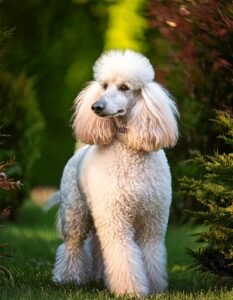 Owning a Poodle is a rewarding experience that comes with specific responsibilities to ensure your companion thrives. By adhering to essential care practices, you can foster a healthy, happy, and well-adjusted pet. Here are five crucial tips to guide you in providing the best care for your Poodle:
Owning a Poodle is a rewarding experience that comes with specific responsibilities to ensure your companion thrives. By adhering to essential care practices, you can foster a healthy, happy, and well-adjusted pet. Here are five crucial tips to guide you in providing the best care for your Poodle:
Regular Veterinary Check-ups
- Schedule annual or bi-annual vet visits to monitor your Poodle’s health, allowing for early detection and management of potential issues.
Consistent Grooming Routine
- Maintain a regular grooming schedule to keep their coat healthy and to check for skin abnormalities or parasites.
Balanced Nutrition
- Provide a high-quality, balanced diet tailored to your Poodle’s size, age, and activity level to support overall health and prevent obesity.
Mental and Physical Stimulation
- Engage your Poodle in regular exercise and mental challenges to keep them physically fit and mentally sharp, reducing the risk of behavioral issues.
Training and Socialization
- Invest time in training and socializing your Poodle from a young age to foster good behavior and adaptability in various environments.
Fun Facts
Poodles are not only known for their elegance and intelligence but also possess a rich history filled with intriguing anecdotes. Beyond their stylish appearance, these dogs have been involved in various remarkable events and roles. Here are three fun facts that highlight the unique and surprising aspects of the Poodle breed:
War Heroes
- Poodles have served as war dogs in history. In the 17th century, Prince Rupert of the Rhine had a Poodle named “Boy” who accompanied him into battle during the English Civil War. Boy was so renowned that he was believed to possess supernatural powers.
Iditarod Participants
- In 1988, a team of Standard Poodles competed in the Iditarod Trail Sled Dog Race in Alaska. Their participation was notable, although many had to drop out due to the harsh conditions, leading to new race regulations specifying suitable breeds for the competition.
Artistic Appearances
- The famous Dutch painter Rembrandt included a Poodle in his self-portrait, showcasing the breed’s prominence and companionship even in the 17th century.

Mastering the First Impression: Your intriguing post title goes here
Engaging Introductions: Capturing Your Audience’s Interest The initial impression your blog post makes is crucial, and that’s where your introduction

The Art of Drawing Readers In: Your attractive post title goes here
Engaging Introductions: Capturing Your Audience’s Interest The initial impression your blog post makes is crucial, and that’s where your introduction

Crafting Captivating Headlines: Your awesome post title goes here
Engaging Introductions: Capturing Your Audience’s Interest The initial impression your blog post makes is crucial, and that’s where your introduction